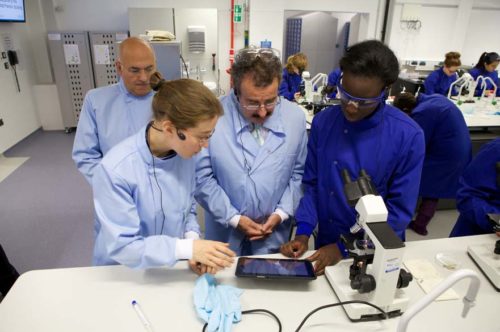COURSE OVERVIEW
Offering a strong foundation in modern biochemistry, this course allows you to explore core subjects such as genetics, cell biology and molecular biology along with specialised fields including bioinformatics and molecular modelling; drug design and development; biotechnology; and genetic engineering.
You gain specialist knowledge in areas such as structure-function relationships; signalling and regulatory systems; and metabolic pathways as well as building the practical laboratory skills to work at the forefront of this exciting and developing field.
WHY CHOOSE THIS COURSE?
- Learn the techniques and practical laboratory skills essential for working in the field of biochemistry
- Benefit from our new science facilities and STEM building, which offer a modern working environment including high-spec laboratories
- Study with research-active experts in their field, many having previously worked at leading institutions such as Cambridge University, Imperial College London and King’s College London
- Develop transferable skills highly sought after by employers, such as independent thinking; planning and problem solving; analysis; and communication skills
- As a graduate, seek wider career opportunities in hospitals, government departments, academic organisations and the publishing industry. Or move on to further study at postgraduate level
- Take the course over four years and include a fee-free year in industry (see below), gaining experience, adding to your CV and making contacts for the future
- If you need to step up into higher education (see below), start with a Foundation Year which guarantees your place on the full degree course
CAREER PROSPECTS
Key aspects of the course that emphasise employability include:
- Training in key laboratory techniques relevant to employment within the Biosciences, including awareness of relevant health and safety, legal and ethical considerations
- Training and practice in the scientific method that underpins all scientific research (developing novel hypotheses, testing these by experiment, accurately interpreting data and understanding error, and drawing valid conclusions)
- Practice in professional standards of reporting including laboratory reports using the standards of professional research publications, preparation of scientific conference posters, and written and oral presentations
- Maintenance of laboratory diaries and research diaries following standard practice within the field
- Guest lectures from employers and from the University’s careers service
- Graduates from our BSc (Hons) Biochemistry course may seek employment within academic or government research laboratories, or within the pharmaceutical or biotechnology industries. Relevant science jobs outside of laboratory work include teaching, scientific equipment sales reps, scientific journalism or media, and public awareness of science. Furthermore, the training our students receive in information sourcing, data analysis, and presentation skills are relevant and important to a broad range of non-science careers from managerial posts to politics.
- Graduates from our BSc (Hons) Biochemistry course may also pursue further scientific training through a variety of Masters programmes or PhDs related to biosciences, or through graduate entry medicine or dentistry programmes.
Zobacz więcej na stronie uniwersytetu >>
Wiza studencka do Wielkiej Brytanii
Aby studiować w Wielkiej Brytanii potrzebujesz wizy studenckiej. Aby złożyć wniosek o taką wizę studencką musisz zdjać certyfikat językowy na poziomie B2.
Uważaj! Do celów wizowych musisz wybrać wyłącznie egzamin w wesji Secure English Language Test (SELT) UKVI .
Co to jest test SELT UK VI registration? Przeczytaj więcej o testach SELT UKVI >>




















